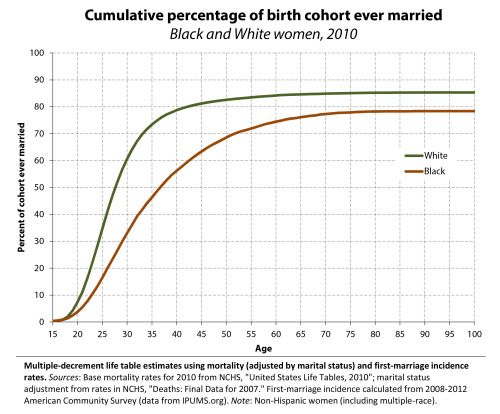The Stats on Black Women and Marriage are Probably Not as Bad as You Think

At some point, any straight Black woman who desires marriage is confronted with the supposed statistics that indicate that she is destined to live out her days insufficiently partnered. Although the dating pool can feel like a wasteland, the average Black woman's chances of finding a mate are not hopelessly low.
Philip Cohen is a sociologist and demographer who teaches at the University of Maryland. For Harriet's editor-in-chief, Kimberly Foster, spoke to him about his work on Black women and the marriage market. His work reveals how a closer look at the data complicates popular narratives about Black women and partnership.
For Harriet: Could you give me a brief overview of the work that you do?
Philip Cohen: Well, I'm a sociologist and a demographer, so I'm generally interested in questions related to family, family structure, gender and gender inequality, different kinds of inequality, sort of from a demographic perspective. I'm usually looking at census data and other sources of data on the US population.
FH: You've done some research about Black women and marriage that I found to be particularly interesting. Let's say that I am a heterosexual Black woman who desires marriage, and I'm living in a major US metropolitan area. Am I out of luck?
PC: Well, no, I wouldn't say you're out of luck necessarily, but I would say that the odds are against you relative to the odds that women from other groups face. I guess you could say out of luck, but that would be a harsh way of putting it.
I hesitate to translate, or try to translate, the research, but in general terms, yes. The numbers are problematic for a couple of reasons. One is that Black women have just about the lowest rate of inter-marriage. We're really looking at the black male population when we're looking at the marriage pool.
FH: Can we get a brief description of what inter-marriage is?
PC: I just mean black women are less likely to marry men from other races than other women are.
Normally the way it works, just in terms of the math is, the smaller the minority group, the more likely they are to marry outside their group. And that just makes sense in terms of the numbers. You do see, for example, black women who live in cities with smaller black populations are more likely to marry whites. But, just the way racism works in America means that this is going on less with black women than it is with other groups. That's one issue.
On the other hand, there are things working against the availability of men for black women. Those are a lot of the bad news that you are familiar with, starting with mortality; Black men are more likely to die than other men; incarceration, black men are at the very high rate of incarceration that we all know about. Then there are the after-effects of that that are harder to measure, like employment problems and other sorts of harms that incarceration causes to men. Of course not just men, but we're talking about men. Then black men, also, as you probably know, have higher rates of inter-marriage than black women. That also takes some men out of the pool. For all of those reasons: mortality, incarceration, employment problems, and unbalanced intermarriage rates the deck is stacked against black women.
FH: But, ultimately, you found that the disparity in marriage rate between black and white women is probably lower than we assumed?
Male: Yeah. That was really interesting given what I just got done saying. We know that the marriage rates among younger people, people in their 20s and 30s are quite a bit lower for black women than white women. They're [Black women] much more likely to be single parents. It was surprising to, sort of, run the numbers. I used a demographic technique called a life table.
You're right. What I ended up finding is a gap of only about 7% between black and white women. In the end, I've had about 78% of black women eventually marrying compared to 85% of white women. So, not such a big gap. The difference turns out to be that a lot more black women marry at older ages than white women. So, after about age 33, if you look at the people who've never been married, a black women age 32 or older is actually more likely to get married at some point than a white women age 33 or older. White women have a much higher marriage rate in their 20s. They're much more likely to get married then than black women—almost twice as likely. But a lot more black women than demographer's assumed get married at older ages.

Image Credit: Philip Cohen/Familly Inequality
PC: Yeah. Well, I sort of just came across it, and I don't really have a great explanation.
But, it does seem that it could be related to what I was saying earlier about the sort of the numbers problem. If you're desiring marriage and you go about your day keeping your eye open for an eligible person, if the numbers are stood against you or the pool is not good, then it's likely that it just takes longer. That may mean that the people that you're dating are having relationships where it doesn't work out or they don't seem like the right person you want to marry in the end, or just the stuff that happens over the course of life is less likely to lead to getting married earlier just because there aren't many choices.
It's hard for me to say that without seeming judgmental or negative of the people and marriage market, but that's trying to put it in math terms.
FH: No. I think that the context of data is really useful here. Have you looked, at all, at the way educational attainments impacts the likelihood of black women getting married?
PC: I actually have looked at a couple of the numbers. So, it certainly is true that for both white and black women, people with more education are more likely to get married. Also, more likely to stay married. If you just look, for example, at women who are age 20 to 39, those who are a high school graduate or less, 2.6% of black women get married in a given year; for those who are college graduates, 4.6% [get married]; and those who have an advanced degree, 6.7%. There is an increase in marriage rates with higher levels of education. It's a little bit tricky because women in general, but black women in particular, are more likely to have more education than the men in their same group.
You do have more black women marrying husbands with a lower level of education than themselves. That's part of that.
PC: Well, I do in two different ways. There certainly is sort of a shaming, scorn kind of view, especially toward single mothers—that they have a negative attitude towards marriage, or that if they were less dismissive about marriage or had less negative attitudes, then they could get married their children won't grow poor, and all that racist stuff.
Well, okay, so you want to get married, but who are you supposed to marry? I've looked at about a hundred and sixty cities. The average black woman is living in a city where, for every hundred single women, there's only eighty single men, black men. Whereas for white women, it's the other way.There are a hundred and fifteen single men for every hundred white women in the average city. So, you know, the numbers are against you to that extent. I think we should dial down the blame on that.
On the other hand, [based on] the relatively higher lifetime marriage rates, we're kind of looking at the timing of this a little wrong. There's more later marriage than we thought. And it really sort of goes against the idea that black women, or couples, actually have something against marriage. It actually seems more like it's either harder to do it earlier in life or people are sequencing their lives differently— they're developing their careers first. Maybe they're having and raising children for more years before they get married, and it's sort of just not the very typical life course that we might have expected.
Photo Credit: Shutterstock
No comments: